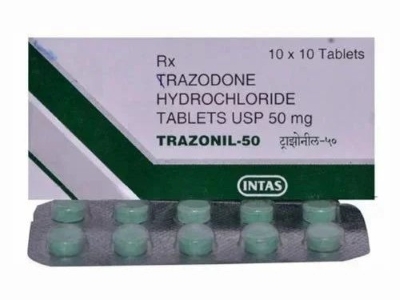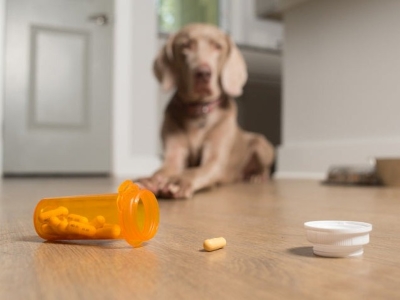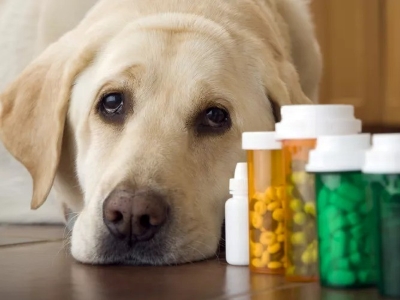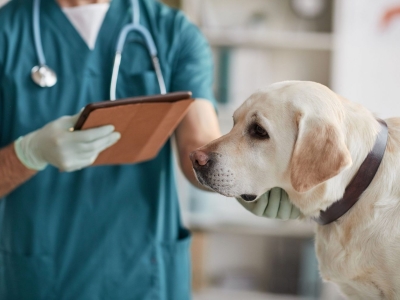As responsible dog owners, we often worry about the medications we give our furry companions.
Trazodone, a medication commonly prescribed for various behavioral issues in dogs, has garnered attention for its potential effects.

The question arises: can Trazodone kill a dog?
In this article, we’ll dive into the world of Trazodone, its uses, potential risks, and why responsible usage is crucial.
Contents
Understanding Trazodone
Trazodone is a medication primarily used in humans to treat depression and anxiety.

In recent years, veterinarians have started prescribing it “off–label” for dogs to manage separation anxiety, noise phobias[1], and other behavioral problems.
While it’s generally considered safe for canine use, there are important factors to consider when administering Trazodone to your furry friend.
Can A Trazodone Kill Dogs?
For the purpose of addressing a variety of behavioral problems, anxiety, and certain medical ailments, veterinarians will occasionally prescribe the drug trazodone to dogs.
When administered at the appropriate dose under the guidance of a veterinarian, trazodone is generally considered safe for dogs.
However, misuse or improper dosing can potentially lead to adverse effects, including serious health risks[2].

Doses over 250 mg per pound can be fatal.
Some dogs can be much more sensitive to Trazodone than other dogs, and lower doses can cause severe side effects and even death in some dogs.
In some cases, an overdose of trazodone can result in symptoms such as lethargy, vomiting, diarrhea, rapid heart rate, and even seizures.
Therefore, it is crucial to strictly follow your veterinarian’s instructions and dosage recommendations when giving trazodone to your dog to avoid any potential harm.
If you suspect that your dog has ingested a significant amount of trazodone or is displaying severe adverse reactions, it is imperative to seek immediate veterinary attention.
Only a trained veterinarian can accurately assess your dog’s condition and provide the appropriate treatment to ensure their safety and well–being.
Trazodone Dosage for Dogs
Dosage is one of the main issues with trazodone.
The dosage of trazodone for dogs depends on several factors, such as their weight, health condition, and reason for treatment.
Generally, the dosage ranges from 2.2 to 14 milligrams per kilogram (mg/kg) of body weight per day. For example, a 10-kg dog would receive between 22 and 140 mg of trazodone per day.

The dosage can be divided into two or three smaller doses throughout the day, depending on the frequency and severity of the symptoms.
The dosage of trazodone that you may give your dog based on how much it weighs is shown in the table below.
| Dog Weight (lbs) | Dog Weight (kg) | Low Dosage (in mg) | High Dosage (in mg) |
| 10 | 4.5 | 7.65 | 42.75 |
| 20 | 9.1 | 15.47 | 86.45 |
| 30 | 13.6 | 23.12 | 129.2 |
| 40 | 18.1 | 30.77 | 171.95 |
| 50 | 22.7 | 38.59 | 215.65 |
| 60 | 27.2 | 46.24 | 258.4 |
| 70 | 31.8 | 54.06 | 301.1 |
| 80 | 36.3 | 61.71 | 344.85 |
| 90 | 40.8 | 69.36 | 387.6 |
| 100 | 45.4 | 77.18 | 431.3 |
| 110 | 49.9 | 84.83 | 474.05 |
| 120 | 54.4 | 92.48 | 516.8 |
| 130 | 59 | 100.3 | 560.5 |
| 140 | 63.5 | 107.95 | 603.25 |
| 150 | 68 | 115.6 | 646 |
| 160 | 72.6 | 123.42 | 689.7 |
| 170 | 77.1 | 131.07 | 732.45 |
| 180 | 81.6 | 138.72 | 775.2 |
| 190 | 86.2 | 146.54 | 818.9 |
| 200 | 90.7 | 154.19 | 861.65 |
Trazodone should always be given under the guidance of a veterinarian, who can adjust the dosage according to the individual response and tolerance of the dog.
Trazodone should also be given with food or on an empty stomach, depending on how the dog reacts to the medication.
Some dogs may experience vomiting or diarrhea if given trazodone without food, while others may not absorb the drug well if given with food.
Potential Side Effects of Trazodone
Trazodone normally produces modest side effects, such as tiredness, reduced appetite, and gastrointestinal distress, when prescribed and taken properly.

Trazodone normally produces modest side effects, such as tiredness, reduced appetite, and gastrointestinal distress, when prescribed and taken properly.
Trazodone Overdose and Toxicity in Dogs
Trazodone overdose in dogs can occur if the dog ingests more than the prescribed amount, either accidentally or intentionally.
For example, a dog may find and eat a bottle of trazodone pills that were left within reach, or a pet owner may give too much trazodone to their dog without consulting a veterinarian.
Trazodone overdose can also happen if the dog is given other medications that interact with trazodone, such as monoamine oxidase inhibitors (MAOIs), selective serotonin reuptake inhibitors (SSRIs), or serotonin-norepinephrine reuptake inhibitors (SNRIs).
The signs and symptoms of trazodone overdose in dogs can vary depending on the amount ingested and the time elapsed since exposure.
Typically, the signs appear within 30 to 60 minutes after ingestion and can last for 10 to 12 hours or longer.
Some of the common signs of trazodone overdose in dogs are:
- Excessive sedation and lethargy
- Loss of coordination and balance
- Vomiting and diarrhea
- Panting and drooling
- Hyperactivity and agitation
- Shaking and tremors
- Restlessness and pacing
- Dilated pupils and increased sensitivity to light
- Increased or decreased heart rate and blood pressure
- Difficulty breathing and apnea
- Seizures and convulsions
- Priapism (a prolonged and painful erection)
- Cardiac arrhythmias (abnormal heart rhythms)
- Coma and death
The severity of these signs can range from mild to life-threatening, depending on the dose and duration of exposure.
If left untreated, a trazodone overdose can cause serious damage to the brain, heart, liver, kidneys, and other organs.
Treatment for Trazodone Overdose in Dogs
If you suspect that your dog has overdosed on trazodone, you should seek immediate veterinary attention.
Do not try to induce vomiting or give any home remedies to your dog without consulting a veterinarian first.
Depending on the situation, your veterinarian may recommend one or more of the following treatments:
- Decontamination:
This involves removing any remaining trazodone from the dog’s stomach by inducing vomiting or administering activated charcoal.
However, this may not be effective if the signs have already developed or if more than two hours have passed since ingestion.
- Intravenous fluids:
This helps to maintain hydration, blood pressure, and kidney function in the dog.
- Symptomatic and supportive care:
This includes monitoring vital signs, administering oxygen therapy, controlling seizures with diazepam or other anticonvulsants, reversing serotonin syndrome with cyproheptadine or other antagonists, managing priapism with ice packs or surgical intervention, correcting cardiac arrhythmias with antiarrhythmics or pacemakers, and providing pain relief with opioids or other analgesics.
- Hospitalization:
This may be required for intensive care and observation until the dog recovers from the overdose.
The prognosis for trazodone overdose in dogs depends on several factors, such as the amount ingested, the time elapsed since exposure, the presence of other medications or substances in the system, and the response to treatment.
In most cases, dogs can recover from a trazodone overdose with prompt and appropriate veterinary care.
However, some dogs may suffer from long–term complications or even die from a trazodone overdose, especially if the overdose is severe or untreated.
The Importance of Veterinary Guidance
Administering any medication to your dog, including Trazodone, should always be done under the guidance of a veterinarian.

They can accurately assess your dog’s needs, prescribe the appropriate dosage, and monitor your dog’s response to the medication.
Veterinarians also consider any pre–existing health conditions your dog might have, which could affect the medication’s safety.
Prevention of Trazodone Overdose in Dogs
A prescription drug called trazodone is used to treat a number of ailments in dogs, including anxiety and behavioral problems.
It’s crucial to take precautions to protect your dog’s safety because a trazodone overdose can result in major health problems[3].
Here are some steps you might want to consider to prevent a trazodone overdose in dogs:
- Secure Medication
Keep all medications, including trazodone, out of your dog’s reach.
Store them in a secure place, ideally in a locked cabinet or on a high shelf that your dog can’t access.
- Follow Dosage Instructions
Never deviate from your veterinarian’s recommendations while giving medicine.
Never alter the dose without first talking to your vet.
- Supervise Administration
If you need to administer trazodone to your dog, do so under supervision. Make sure the entire dose is ingested and that your dog doesn’t spit it out or regurgitate it.
- Monitor Behavior
After feeding your dog trazodone, keep an eye on their behavior for any indications of side effects, including excessive drowsiness, confusion, vomiting, or breathing difficulties.
- Regular Vet Visits
Visit your vet frequently to go over your dog’s health and how well the medicine is working. If required, your veterinarian could change the dose.
- Dispose of Unused Medication
If your dog’s treatment plan changes or if there is any unused medication, dispose of it properly. Do not keep extra medication around, as it increases the risk of accidental ingestion.
- Emergency Preparedness
Keep your veterinarian’s contact information, as well as the number for an emergency animal poison control hotline, readily available.
In case of an overdose or any other emergency, you can quickly seek professional help.
Remember, the information provided here is not a substitute for professional veterinary advice.
If you suspect your dog has ingested too much trazodone or any other medication, contact your veterinarian or an emergency animal poison control center immediately.
They can provide specific guidance based on your dog’s condition and the circumstances of the situation.
By doing so, you can ensure the well-being and happiness of your furry friend.
FAQs
Can Trazodone make my dog aggressive?
It’s critical to keep an eye on your dog’s reaction to the medicine, even though trazodone is frequently used to treat aggressive behavior linked to anxiety.
You should speak with your veterinarian if you see any strange or alarming behavior.
Can Trazodone be overdosed in dogs?
Trazodone can be overdosed on in dogs, Yes.
Severe drowsiness, confusion, nausea, vomiting, diarrhea, and maybe seizures may follow an overdose. Applying the precise amount recommended by a veterinarian is essential.
Can Trazodone be used alongside other medications for dogs?
Trazodone’s compatibility with other medications depends on the specific medications and the dog’s health condition.
Always inform your veterinarian about any other medications your dog is taking to ensure there are no potential interactions.
How long does it take for Trazodone to take effect in dogs?
Each dog will react to Trazodone differently at first. Trazodone often takes 30 minutes to many hours to begin functioning.
Depending on the particular dog, its effects may last for a different amount of time.
Can Trazodone be used for all dog breeds and sizes?
Numerous dog breeds and sizes can benefit from trazodone treatment.
The right dose, however, may differ based on your dog’s size, weight, and unique traits.
The ideal dose for your particular dog should always be determined in consultation with your veterinarian.
Conclusion
While Trazodone can be a helpful tool in managing certain behavioral issues in dogs, it’s not without its risks.
The question of whether Trazodone can kill a dog highlights the importance of responsible usage and veterinary oversight.
When used correctly under the guidance of a qualified veterinarian, Trazodone can provide relief for anxious and stressed dogs, ultimately enhancing their well-being and quality of life.
Always prioritize your dog’s safety and consult a veterinarian for any concerns or questions about medication.
Reference:
- Noise phobias in dogs. (n.d.) | PDSA
- Dogs | Healthy Pets, Healthy People | CDC
- Health issues in dogs | Health and dog care | Kennel Club

Dania is a dog groomer living in California, who loves styling dogs. She often uses dog accessories to keep them distracted while grooming. She is also a dog parent to a Pomeranian, Duke. It’s because of him she is always on a lookout for the best dog foods, toys, other dog accessories, and ways to keep him equipped, healthy and happy.


